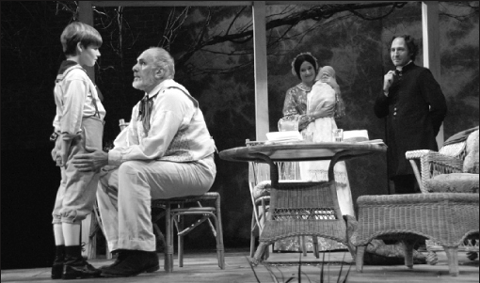By Jerry Tallmer
Most people in so-called civilized countries have heard of Charles Darwin, even those who today wish to set the clock back to where there is no theory of evolution.
Not too many people today have heard of Alfred Russel Wallace, but in fact the theory of evolution was once called the Darwin-Wallace theory of evolution, with Wallace sort of fading out of the picture in the ensuing century, only lately to be rediscovered.
At the moment he is being rediscovered here in the world premier of a drama called “Trumpery,” by Peter Parnell, directed by David Esbjornson, at the Atlantic company’s Linda Gross Theatre on West 20th Street.
The two great 19th-century naturalists, Darwin (1809-82) and Wallace (1823-1913), worked out the laws of natural selection and survival of the fittest from different research, different findings, different experience at more or less the same time. The problem — at least for Darwin — was that it was taking him the devil of a long haul, something like 20 years, to write it all into a book. And now the somewhat younger Wallace, who with all else was one of the world’s great explorers, has just turned up — worn, weary, storm-battered, and dead broke — at family man Darwin’s comfortable home in the English countryside, that arrival having been preceded by a letter from Wallace congratulating Darwin on their joint revolutionary contribution to the history, the footprints, of the human species.
Panic time. Guilt time. Darwin (actor Michael Cristofer) wants the recognition, the fame — to be all his own. He suppresses Wallace’s letter. His friends, particularly the brilliant iconoclastic Thomas Huxley (Neal Huff) — known at the time as “Darwin’s bulldog” — support him in this. But then the guilt bubbles up from the depths, and Darwin changes his mind …
Therein lies a play.
Darwin’s guilt, says Parnell, stems as much as anything from parallel feelings of fear and responsibility — fear of his own (passive) aggression in wanting to win that fame; responsibility to his wife Emma (Blanca Amato), to his children, in particular, a dying 13-year-old daughter, to his friends, to mankind, to science, maybe even to apes.
“He was also aware he was about to throw a bombshell into Victorian society,” says Parnell. Indeed, one of the dramatic pivots within the drama is when Emma begs Charles to pray to God to save their daughter, and try as he may, on his knees, Darwin simply cannot do it. If the origin of species has not killed God, it has at least put Him in cold storage.
“Huxley, unlike Darwin, was not afraid of his own aggression. Darwin, when he finally met Wallace (Manoel Felciano), was surprised at Wallace’s character, disposition, and generosity — not that Darwin didn’t have those qualities, but [they were those of] a very different [social] class.
“He had married his first cousin, Emma Wedgewood — yes, of the Wedgewood china family — and the children of first cousins often died in those days. Darwin himself was the son of a well-off doctor; and he invested well. Whereas Wallace, a disciple of the utopian socialism of Robert Owen, was from a much poorer family in Wales, and had grown up taking many jobs, among them as a surveyor with his brother in an era of Corn Laws and riots.”
The completion of “Trumpery” may not have taken Peter Parnell 20 years, but “as a writer I’m very, very slow,” says he. “Many, many drafts. Many years. When I began, Darwin and Wallace were each 15 years younger than they are in the play as it now stands.”
Some signs of Darwin’s guilt emerge during a séance in Act II. Wallace was a big believer in séances. Does Peter Parnell believe in them?
“I’ve never been to one,” he says. “I would love to be involved in one. Peter Maloney, who plays the medium, knows a lot about it.” Then, dryly: “I do believe in séances for theatrical and dramatic purposes.”
Peter Parnell, born August 21, 1953 — his father is a retired export-import fabric executive — went to public high school in Queens, and then to Dartmouth College, in Hanover, New Hampshire, where he first started writing plays, and being in them, and — subsequently — teaching them.
His works include “Sorrows of Stephen” (“about a young man in New York reading Goethe and then falling in love with his best friend’s girlfriend”); “QED” (about the physicist Richard Feynman, youngest man on the Manhattan Project); and “The Rise and Rise of Daniel Rocket” (“about a boy who could fly, and didn’t want anyone to know”).
But more than any of those, at least in relevance to survival of the fittest, is a Simon & Schuster picture book (illustrations by Henry Cole) that Parnell wrote with Justin Richardson, the partner with whom he lives just off Washington Square.
“It’s called ‘And Tango Makes Three,’ and it’s a true story about two gay male penguins in the Central Park Zoo — Roy and Silo — who built a nest and tried to hatch a rock because they wanted to have a baby. And a zookeeper took a fertilized egg to these two penguins, and they sat on it and hatched it, and the chick is named Tango.”
Obviously, the origin of a whole new species.
TRUMPERY. By Peter Parnell. Directed by David Esbjornson. Opens tonight, December 5, and runs through December 30 as an Atlantic Theater Company presentation at the Linda Gross Theater, 336 West 20th Street, (212) 279-4200.




































